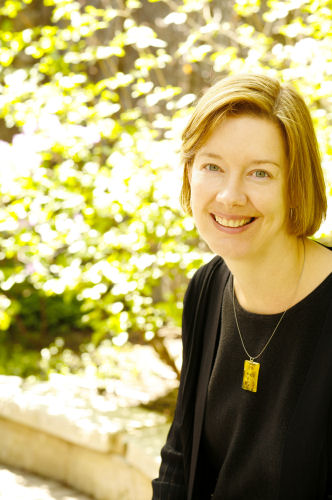Helen E. Blackwell: Taking on dangerous diseases one bacterium
at a time
"Chemistry is the basis for so much around
us — you can't help but see it and be amazed."
 An
effective communicator with everyone from non-scientific
audiences to graduate-level college students, UW-Madison
Associate Chemistry Professor Helen E. Blackwell is one of the
truly outstanding young chemists in the country. She is
recognized as a major leader in scientific research, while also
teaching undergraduate chemistry classes and mentoring graduate
students. Last year she was named one of Popular Science
magazine’s "Brilliant 10." An
effective communicator with everyone from non-scientific
audiences to graduate-level college students, UW-Madison
Associate Chemistry Professor Helen E. Blackwell is one of the
truly outstanding young chemists in the country. She is
recognized as a major leader in scientific research, while also
teaching undergraduate chemistry classes and mentoring graduate
students. Last year she was named one of Popular Science
magazine’s "Brilliant 10."
As disease-causing bacteria
continue to be a serious threat to public health, Professor
Blackwell and her group are exploring a new way to fight these
dangerous microorganisms. This work is important because, while
disease bacteria can be harmless in small numbers, they become
much more dangerous when they congregate. Each individual
bacterium makes and releases chemicals that can be detected by
other bacteria, which is called "quorum sensing." When large
amounts of these chemicals are detected, the bacteria gang up
and can produce "biofilms" which are slimy bacterial mats
(basically, layers of bacteria) that cause chronic infections
and even dental plaque.
Blackwell’s
approach is to trick the bacteria by developing new chemicals
that either mimic or block this communication between bacteria.
This same trick could also be used to encourage the activities
of good bacteria — such as those that eat pollution or
manufacture biofuels. They have already found many promising new
compounds to block the communication between two of the most
dangerous infections: methicillin-resistant Staphylococcus aureus (MRSA) and
Pseudomonas aeruginosa (an opportunistic
infection that targets patients with compromised immune
systems).
MRSA has been known
as the most resistant hospital-acquired infection, but people
are now also getting it outside hospital settings. "Strains are
emerging that are resistant to all known antibiotics," says
Blackwell. "It’s reaching crisis proportion and this is going to
become a real issue in the next decade." She notes that most
large pharmaceutical companies are no longer involved in this
type of research because the drugs are not seen as profitable.
But her goal is to develop these therapeutic drugs, in hopes
that academic research can fill this gap left by the drug
companies.
In
addition to her groundbreaking
research, she is also devoted to her undergraduate and graduate
students. During her time at UW, Blackwell has won numerous
teaching awards, including the UW-Madison Chancellors
Award for Distinguished Teaching (2006), the DuPont Young
Professor Award and the James Taylor Teaching Award (both 2007).
"WISL seeks to
communicate the importance of science to a broader audience
— communication is an underlying theme in my research. Only if we
fully understand the words, can we have a meaningful
conversation. We are learning that this now extends from
bacteria to humans!"
Visit Professor Blackwell's web site:
www.chem.wisc.edu/blackwell
Read Dava Sobel's "Field Notes" piece on Blackwell from Discover Magazine
|